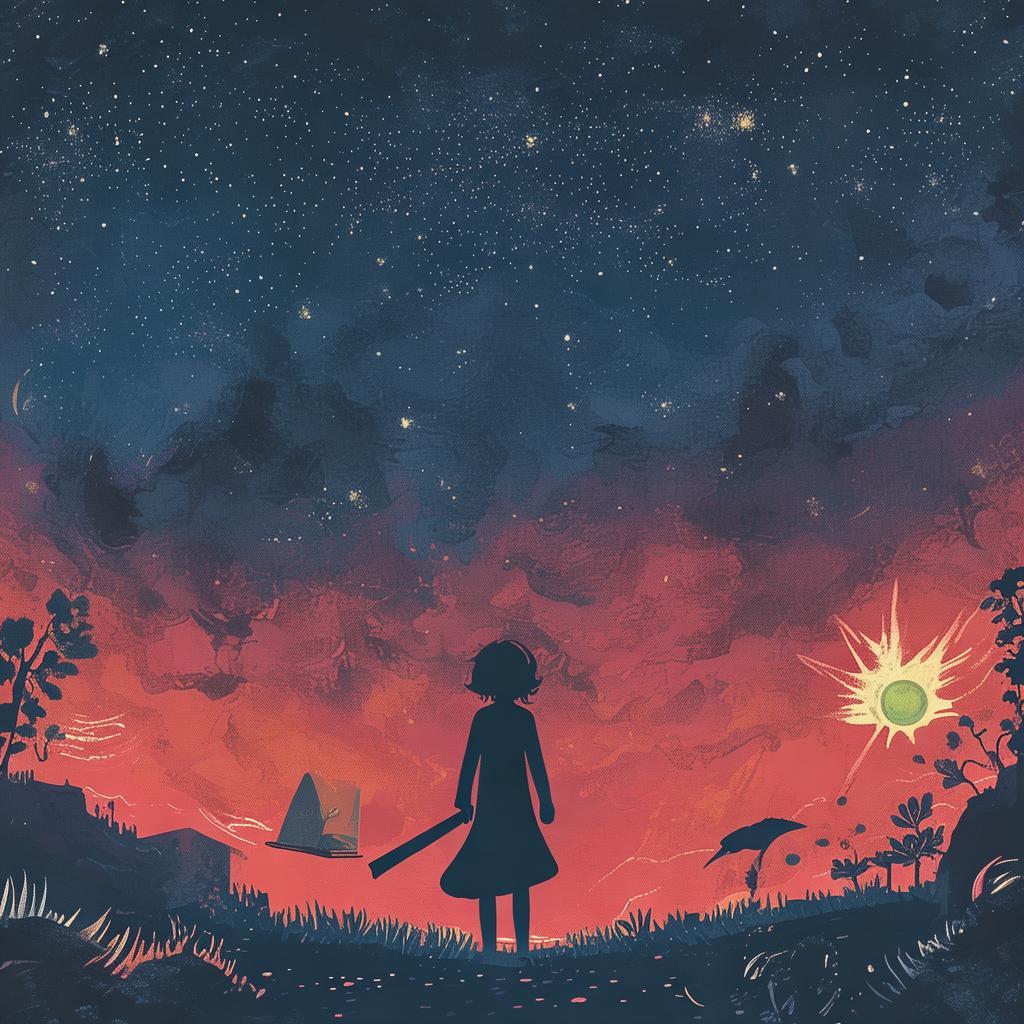The Tensai's Dilemma: A Reflection on Madness
The moon hung low in the sky, casting an eerie glow over the ancient library that served as the sanctuary of the Tensai, a mastermind whose intellect was matched only by his enigmatic nature. The air was thick with the scent of aged parchment and the faint hum of whispered secrets. In the heart of this sanctum, the Tensai sat at his desk, a quill in hand, his eyes reflecting the flickering candlelight.
He had been writing in his Midnight's Memoirs, a chronicle of his thoughts and reflections, when a sudden realization struck him like a bolt of lightning. The Tensai, known for his unparalleled intelligence, found himself at the precipice of madness. His mind, once a beacon of clarity, was now a whirlwind of chaos, and he was the only one who could navigate its treacherous currents.
"Madness," he whispered to himself, the word hanging in the air like a specter. "Is it not the reflection of our deepest fears and desires? Or is it the absence of the very essence that defines us?"
The Tensai's reflection in the mirror was a study in contrasts. His eyes, usually sharp and piercing, were now clouded with doubt. His face, once serene, was now etched with lines of concern. He reached out to touch the glass, as if to grasp the essence of his own reflection, but his hand passed through as if it were a wisp of smoke.
He had always been the one to solve the world's most perplexing puzzles, yet now he found himself ensnared in the greatest enigma of all: his own mind. The Tensai's reflection was a mirror to his madness, and he was forced to confront the question: Could he trust his own perception?

As he delved deeper into his Midnight's Memoirs, the Tensai uncovered memories of his past, fragments of a life that seemed to be unraveling before his eyes. He remembered the first time he felt the pull of madness, a whisper in the wind that grew louder with each passing day. He remembered the moments of clarity that were now replaced by the overwhelming sense of confusion.
The Tensai's journey through his own mind was a harrowing one. He encountered visions of his past, his future, and the alternate realities that his mind conjured. Each vision was a reflection of his own madness, a twisted mirror that showed him the true extent of his inner turmoil.
One night, as he sat in the library, the Tensai's reflection began to change. The lines on his face deepened, his eyes grew wider, and his hair seemed to stand on end. The Tensai, who had always been the master of his own domain, was now a prisoner in his own mind.
"Madness is a double-edged sword," he muttered to himself. "It can cut through the thickest of problems, but it can also cut through the very fabric of one's sanity."
The Tensai's reflection continued to evolve, becoming a representation of his innermost fears and desires. He saw himself as a child, playing in the fields, free from the constraints of the world. He saw himself as a young man, filled with ambition and passion. He saw himself as an old man, looking back on a life well-lived.
But as the visions continued, the Tensai realized that none of these reflections were true. They were merely echoes of his own mind, a reflection of his own madness. He was no longer the master of his own destiny; he was a pawn in the game of his own mind.
In a moment of clarity, the Tensai understood that he could not escape his madness by running from it. He had to confront it head-on, to face the reflection of his own mind and understand the true nature of his inner turmoil.
He stood up from his desk, the quill in his hand now a symbol of his power and his weakness. He walked to the mirror, his eyes meeting his own. "You are not your madness," he said to his reflection. "You are the one who holds the key to unlocking its secrets."
With that, the Tensai reached out and touched the glass, feeling the warmth of his own skin against the cool surface. He took a deep breath, and as he did, the visions began to fade, replaced by the calm of his own mind.
The Tensai returned to his desk, the quill in hand once more. He began to write, not in his Midnight's Memoirs, but in a new journal, one that would document his journey through madness and back to sanity.
As he wrote, the Tensai realized that his reflection was not a sign of his madness, but a testament to his resilience. He had faced the darkest corners of his mind and emerged stronger, wiser, and more determined than ever before.
The Tensai's journey through madness was a harrowing one, but it was also a journey of self-discovery and redemption. He had learned that madness is not a destination, but a reflection of the human condition. And in understanding his own madness, he had come to understand himself.
The Tensai's reflection in the mirror was no longer a source of fear, but a source of inspiration. He had faced the darkness within and emerged victorious, a testament to the strength of the human spirit.
And so, the Tensai continued to write, his words a beacon of hope for those who might one day find themselves lost in the labyrinth of their own minds. For in the end, the Tensai's reflection was not a mirror to his madness, but a mirror to his soul, a reflection of the true essence of who he was.
✨ Original Statement ✨
All articles published on this website (including but not limited to text, images, videos, and other content) are original or authorized for reposting and are protected by relevant laws. Without the explicit written permission of this website, no individual or organization may copy, modify, repost, or use the content for commercial purposes.
If you need to quote or cooperate, please contact this site for authorization. We reserve the right to pursue legal responsibility for any unauthorized use.
Hereby declared.









